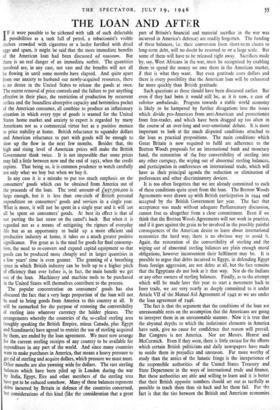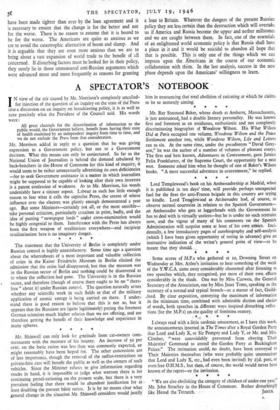THE LOAN AND AFTER
I F it were possible to be sickened with talk of such delectable possibilities as a tank full of petrol, a tobacconist's visible shelves crowded with cigarettes or a larder fortified with dried eggs and spam, it might be said that the more immediate benefits of the American loan had been discussed ad nauseam. But there is no real danger of an immediate surfeit. The quantities involved are, in any case, not vast and the benefits will not all be flowing in until some months have elapsed. And quite apart from our anxiety to husband our newly-acquired resources, there is no desire in the United States to release the goods at once. The recent removal of price controls and the failure to put anything effective in their place, the restriction of production by recurrent strikes and the boundless absorptive capacity and bottomless pocket of the American consumer, all combine to produce an inflationary situation in which every type of goods is wanted for the United States home market and anxiety to export is regarded by many Americans not as a commercial virtue but as a positive menace to price stability at home. British reluctance to squander dollars and American reluctance to part with goods will be enough to slow up the flow in the next few months. Besides that, the high and rising level of American prices will make the British Government think twice. . It is not impossible that some prices may fall a little between now and the end of 1951, when the credit expires. That being so, it is common prudence to watch carefully not only what we buy but when we buy it.
In any case it is a mistake to put too much emphasis on the consumers' goods which can be obtained from America out of the proceeds of the loan. The total amount- of £937,500,000 is large enough, but it is less than one-sixth of British personal expenditure on consumers' goods and services in a single year. What is more, it will not be spent in a single year and it will not all be spent on consumers' goods. At best its effect is that of not putting the last straw on the camel's back. But when it is regarded not as a means of mitigating the rigours of everyday life but as an opportunity to build up a more efficient and productive industry at home, it takes on a much greater positive significance. For great as is the need for goods for final consump- tion, the need to re-convert and expand capital equipment so that goods can be produced more cheaply and in larger quantities in a few years' time is even greater. The granting of a breathing space in which British industry can be built up to a higher pitch of efficiency than ever before is, in fact, the main benefit we get out of the loan. Machinery and machine tools to be purchased in the United States will themselves contribute to the process.
The popular concentration on consumers' goods has also obscured the fact that a very large proportion of the loan will not be used to bring goods from America to this country at all. It will be earmarked for the purpose of restoring the convertibility of sterling into whatever currency the holder pleases. The arrangements whereby the countries of the so-called sterling area (roughly speaking the British Empire, minus Canada, plus Egypt and Scandinavia) have agreed to restrict the use of sterling acquired by them, are ended by the loan agreement. We must now arrange for the current sterling receipts of any country to be available for expenditure in any part of the world. And since many countries want to make purchases in America, that means a heavy pressure to get rid of sterling and acquire dollars, which pressure we must meet. Other mouths are also yawning wide for dollars. The vast sterling balances which have been piled up in London during the war by India, Egypt, Eire and other members of the sterling area have got to be reduced somehow. Many of these balances represent debts incurred by Britain in defence of the countries concerned, but considerations of this kind (like the consideration that a great part of Britain's financial and material sacrifice in the war was incurred in America's defence) are readily forgotten. The funding of these balances, i.e. their conversion from short-term claims to long-term debt, will no doubt be resorted to on a large scale. But some of them will have to be released right away. Sacrifices made by, say, West Africans in the war, must be recognised by enabling them to spend the money we owe them in the American market, if that is what they want. But even gratitude costs dollars and there is every possibility that the American loan will be exhausted far more quickly than British gratitude.
Such questions as these should have been discussed earlier. But even if they had been it would still be, as it is now, a case of solvitur ambulando. Progress towards a stable world economy is likely to be hampered by further divagations into the issues which divide pro-American from anti-American and protectionist from free-trader, and which have been dragged up too often in the course of an over-long and over-emotional debate. It is more important to look at the much disputed conditions attached to the loan as practical propositions. The main conditions which Great Britain is now required to fulfil are adherence to the Bretton Woods proposals for an international bank and monetary fund, the restoration of the free convertibility of sterling into any other currency, the wiping out of abnormal sterling balances, and participation in conferences on international trade, which will have as their principal agenda the reduction or elimination of preferences and other discriminatory devices.
It is too often forgotten that we are already committed to each of these conditions quite apart from the loan. The Bretton Woods Agreements were drawn up with British participation in 1944 and accepted by the British Government last year. The fact that acceptance was made without adequate Parliamentary discussion, cannot free us altogether from a clear commitment. Even if we think that the Bretton Woods Agreements will not work in practice, and if it goes against the grain to be involved in the possibly painful consequences of the American desire to learn about international economics the hard way, there is no obvious way to avoid it. Again, the restoration of the convertibility of sterling and the wiping out of abnormal sterling balances are plain enough moral obligations, however inconvenient their fulfilment may be. It is possible to argue that debts incurred to Egypt, in defending Egypt from foreign aggression, are not debts at all, but the fact remains that the Egyptians do not look at it that way. Nor do the Indians or any other owners of sterling balances. Finally, as to the attempt which will be made later this year to start a movement back to freer trade, we are very nearly as deeply committed to it under Article VII of the Mutual Aid Agreement of 1942 as we are under the loan agreement of 1946.
The fact is that the argument that the conditions of the loan are unreasonable rests on the assumption that the Americans are going to interpret them in an unreasonable manner. Now it is true that the abysmal depths to which the isolationist elements in America have sunk, give no cause for confidence that reason will prevail. But Congress is not America. Nor are Messrs. Hearst and McCormick. Even if they were, there is little excuse for the efforts which certain British politicians and daily newspapers have made to outdo them in prejudice and unreason. Far more worthy of study than the antics of the lunatic fringe is the inexperience of the responsible authorities of the United States Treasury and State Department in the ways of international trade and finance. But these authorities are able and willing to learn and it is better that their British opposite numbers should set out as tactfully as possible to teach them than sit back and let them fail. For the fact is that the ties between the British and American economies have been made tighter than ever by the loan agreement and it is necessary to ensure that the change is for the better and not for the worse. There is no reason to assume that it is bound to be for the worse. The Americans are quite as anxious as we are to avoid the catastrophic alternation of boom and slump. And it is arguable that they are even more anxious than we are to bring about a vast expansion of world trade to the benefit of all concerned. If disturbing factors must be looked for in their policy, they surely lie in those unmeasured anti-Russian arguments which were advanced more and more frequently as reasons for granting a loan to Britain. Whatever the dangers of the present Russian policy they are less certain than the destruction which will overtake us if America and Russia become the upper and nether millstones and we are caught between them. In fact, one of the essentials of an enlightened world economic policy is that Russia shall have a place in it and it would be suicidal to abandon all hope that that is possible. This is only one of the things which we can impress upon the Americans in the course of our economic collaboration with them. In the last analysis, success in the new phase depends upon the Americans' willingness to learn.



























 Previous page
Previous page